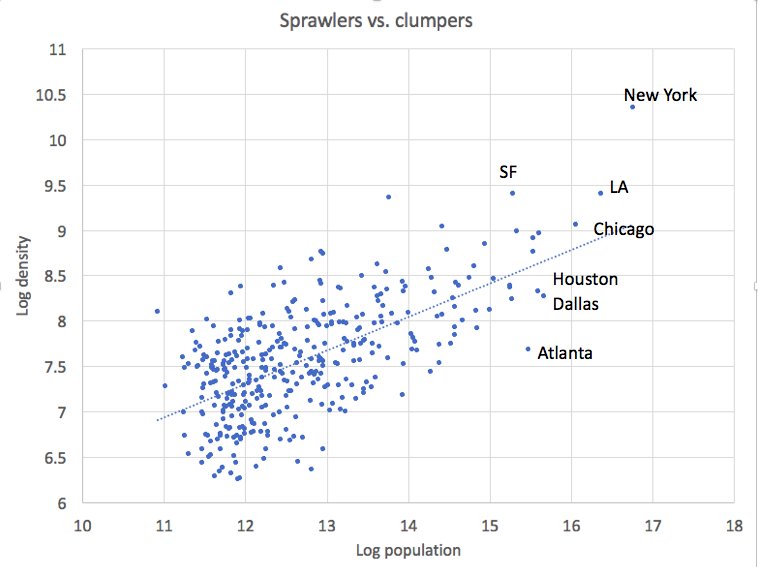
A city such as SF (San Fran) has a higher population density than its population would on average predict that it should. Such a city is "economizing" on land as people live in multifamily housing rather than sprawl.
But, Dr. K is ignoring prices. The reason why people live at higher density in SF , LA and NYC is that land per acre is so expensive. When you live in a high rise , you are sharing space with others and economizing on this scarce asset. Where land is cheaper in Atlanta, Dallas and Houston, people consume more of it.
Now, let me say something smarter. A good economist would ask, is Atlanta land cheap because of supply or demand? In English, is Atlanta undesirable and thus demand is low and this yields low land prices or is Atlanta land cheap because there are fewer zoning restrictions and this shifts out the supply curve or makes it more elastic? How does Dr. K. plan to answer this?
Second, suppose that in a place such as Houston one can buy a nice $500,000 home but one does have to face the Houston humidity and the rising risk of Hurricane Harvey risk. Does this still yield greater expected utility than living in a studio with 4 other guys in NYC for the same rent? What is the good life? What if we have different conceptions of the good life? In a world where people differ (diversity) why can't we be free to choose? We explore some of these themes in the following papers available here and here. If people have different risk aversion parameters then some may choose cheap, humid (and increasingly risky) Houston over more expensive smaller housing on higher ground. Are they "free to choose" to make this choice? Now I recognize that if they receive federal bailouts when disasters do occur that this encourages moral hazard effects and this is ugly and needs to be changed.
Dr. Krugman's tweet raises deep issues regarding the gains to a household from living in its own single detached house (with its own land) versus sharing with strangers. In a world of consumer sovereignty, economists can point out the social costs associated with owning a lot but we can't question where that core private benefit from seeking that lot comes from. As I recall, when Dr. K taught at MIT -- -he had a very nice single family home close to Harvard (I lived in a multifamily building nearby).
Let me end with a real PHD economics question. Dr. Krugman has a clark medal and a nobel prize. I have neither. A real home run paper in this paper will disentangle whether supply side restrictions on housing (i.e zoning) make an area more desirable (i.e shift out demand). Think of Paris or NYC. While Glaeser and Gyourko emphasize the costs of zoning (see the post above), what are the benefits of zoning? In an age of climate change, would Houston be how much resilient of a city if it has zoning? How much more expensive would that $500,000 house I quoted above be? Would it have been built? These are the real questions we must grapple with.
So, if Houston was built at NYC density --- would the land that is currently developed with single family homes be wetlands? If these wetlands did exist, how much would flood risk decline by and how much do the Houston residents (who would be living in multifamily housing) value this? Versus do they prefer to live in cheap , large single family homes that face increased flood risk? Isn't this the core question? In a world where people have different preferences and there are no free lunches, could different urban forms emerge and we let Tiebout sorting playout? Now again, if federal $ is used to bailout risky places then this logic is weakened but perhaps it is now time to name Milton Friedman as the head of FEMA ( I call for this in my 2010 Climatopolis book).